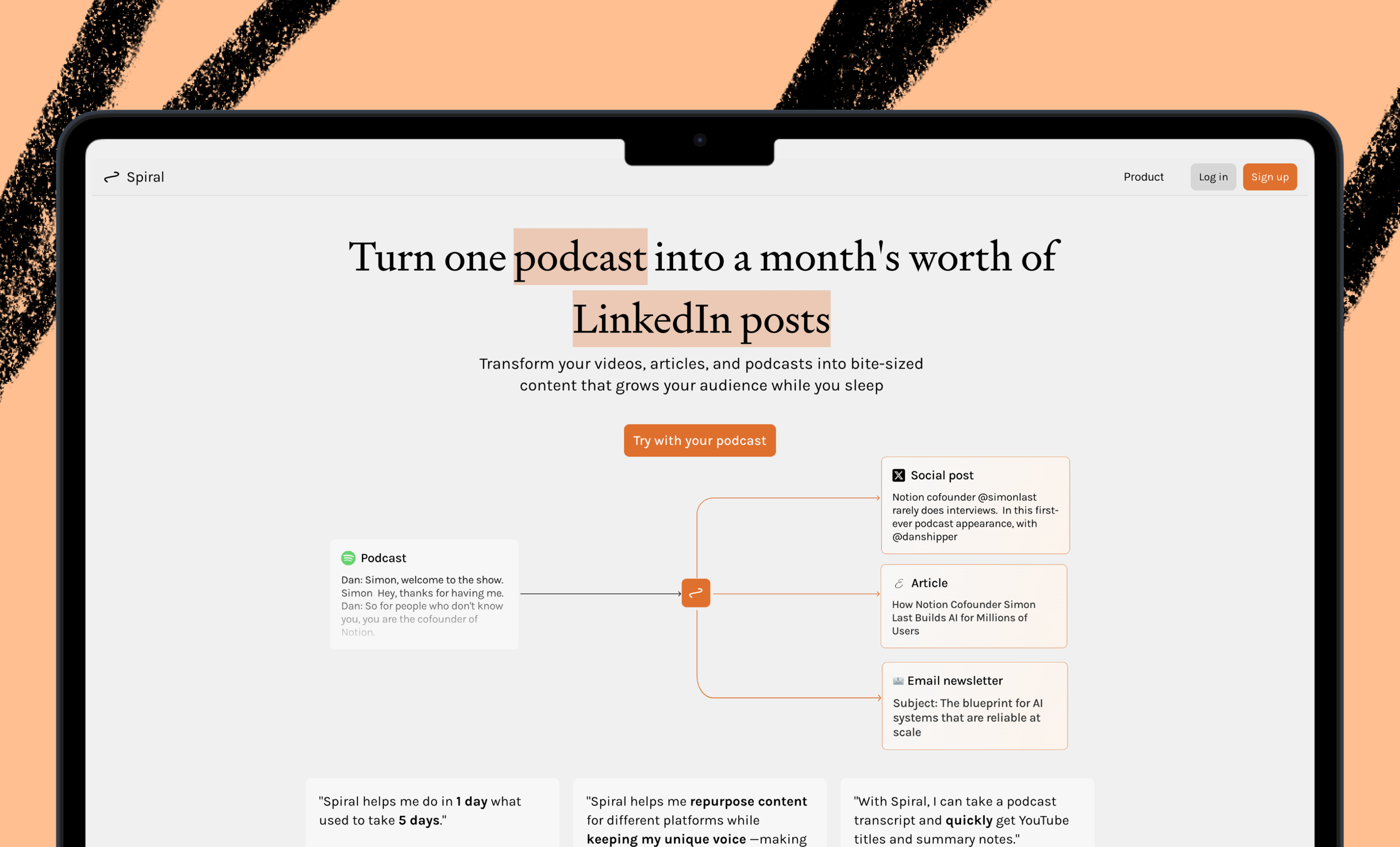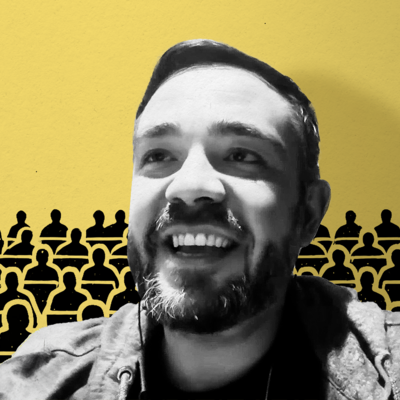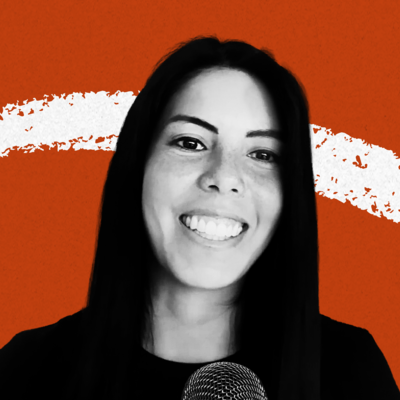.png)
TL;DR: Today we’re releasing a new episode of our podcast AI & I. Dan Shipper sits down with our entrepreneur in residence Naveen Naidu and COO Brandon Gell to talk about how Naveen built Monologue, an AI voice dictation app for Mac that writes the way you talk so you can work faster without breaking flow. Watch on X or YouTube, or listen on Spotify or Apple Podcasts. Here’s a link to the episode transcript.
Was this newsletter forwarded to you? Sign up to get it in your inbox.
Naveen Naidu built an app that found product-market fit backwards.
Most apps launch first and then try to find users. Monologue, Naveen’s AI voice dictation app that came out of beta yesterday, did the opposite. It built a following of thousands of users during its incubation period at Every—many of them switching over from venture capital-backed competitors—all while the app barely had a landing page.
The growth has continued in the 24 hours since launch, with an average of 1 million words being transcribed weekly, and in this episode of AI & I, Dan Shipper and COO Brandon Gell sit down with Naveen to talk about his journey as the single engineer behind a viral app. They get into the false starts and side projects that taught Naveen how to ship fast, the brutal feedback that kept Monologue honest, why Every decided to build in a crowded category, and the AI coding tools that let one developer do the work of a team.
You can check out their full conversation here:
If you want a quick summary, here are some of the themes they touch on:
Build a muscle to ship over and over again
Monologue isn’t the first, second—or even the third—app Naveen built in the past year at Every. He shipped TL;DR, a way to generate podcasts about your company with AI; AI-powered reading companion Kairos; and an app that fixes your grammar called Unwrite. Before that, as an independent developer, he’d spent months on an email marketing client he never showed anyone (we’ll get to why that’s a mistake) and cranked out a handful of Mac apps, most of them ChatGPT wrappers (including one that peaked at $5,000 in monthly recurring revenue).
They weren’t the kind of projects he could see himself devoting the next five years to—or the kind he was ready to scale into real businesses. But they gave him something else that turned out to be just as valuable: a muscle for getting quality apps out the door, fast. “I’m able to build apps really fast. I build one single core feature, post it on Reddit or X, get eyeballs, [and] convert them to sales,” he says.
TL;DR: Today we’re releasing a new episode of our podcast AI & I. Dan Shipper sits down with our entrepreneur in residence Naveen Naidu and COO Brandon Gell to talk about how Naveen built Monologue, an AI voice dictation app for Mac that writes the way you talk so you can work faster without breaking flow. Watch on X or YouTube, or listen on Spotify or Apple Podcasts. Here’s a link to the episode transcript.
Was this newsletter forwarded to you? Sign up to get it in your inbox.
Naveen Naidu built an app that found product-market fit backwards.
Most apps launch first and then try to find users. Monologue, Naveen’s AI voice dictation app that came out of beta yesterday, did the opposite. It built a following of thousands of users during its incubation period at Every—many of them switching over from venture capital-backed competitors—all while the app barely had a landing page.
The growth has continued in the 24 hours since launch, with an average of 1 million words being transcribed weekly, and in this episode of AI & I, Dan Shipper and COO Brandon Gell sit down with Naveen to talk about his journey as the single engineer behind a viral app. They get into the false starts and side projects that taught Naveen how to ship fast, the brutal feedback that kept Monologue honest, why Every decided to build in a crowded category, and the AI coding tools that let one developer do the work of a team.
You can check out their full conversation here:
If you want a quick summary, here are some of the themes they touch on:
Build a muscle to ship over and over again
Monologue isn’t the first, second—or even the third—app Naveen built in the past year at Every. He shipped TL;DR, a way to generate podcasts about your company with AI; AI-powered reading companion Kairos; and an app that fixes your grammar called Unwrite. Before that, as an independent developer, he’d spent months on an email marketing client he never showed anyone (we’ll get to why that’s a mistake) and cranked out a handful of Mac apps, most of them ChatGPT wrappers (including one that peaked at $5,000 in monthly recurring revenue).
They weren’t the kind of projects he could see himself devoting the next five years to—or the kind he was ready to scale into real businesses. But they gave him something else that turned out to be just as valuable: a muscle for getting quality apps out the door, fast. “I’m able to build apps really fast. I build one single core feature, post it on Reddit or X, get eyeballs, [and] convert them to sales,” he says.
He also learned to give himself permission to start small and stay scrappy. “I have a small idea, just code it up, and release it. It doesn't have to be, ‘Oh, a lot of features have to be there,’ or ‘Billing has to be there’—I just figure it out on the way. That was a big mental shift for me during that time,” he says.
So when the energy around Unwrite started to fade, Naveen fell back on that muscle memory. He quietly began tinkering with an idea on the side, and that experiment became the very first version of Monologue.
Don’t work in the dark
Another lesson Naveen carried into Monologue was to never build in the dark. He’d learned that the hard way with the email marketing client he spent six months on without ever showing anyone. “I didn’t even talk to anyone about it because I was really ashamed [for working on the product for so long in a vacuum],” he admitted. It sat on his laptop; Brandon, who talks with him every week, didn’t even know it existed until this podcast recording.
Naveen was determined not to go down the same road with Monologue. This time, he set up a dedicated Discord channel that became the nerve center for high-fidelity internal feedback. Early on, Kieran Klaassen, general manager of Cora and (in)famously one of Every’s toughest critics when it comes to new products, posted a screenshot of a bug with the deadpan caption: “immediate churn.” Blunt, but effective. “If I keep Kieran happy, I’m going to keep a ton of people happy,” Naveen says.
And finally, Naveen dogfooded relentlessly. In fact, one of Monologue’s standout features—auto-enter, which automatically processes your dictation and submits it (the equivalent of hitting “enter”) without you ever touching the keyboard—was born because Naveen got annoyed while writing code for Monologue, using Monologue. “Why am I always hitting “enter”? Why can’t it do that for me?” he thought. A day later, it did.
Naveen’s AI-coding-tools stack
Naveen’s workflow has been a moving target as new AI coding tools become available. In the very early days of Monologue, he leaned on AI code editor Windsurf, one of the first to experiment with agentic coding. From there, Claude Code became his mainstay—most of Monologue’s codebase was written using it.
He recently began using OpenAI’s coding agent Codex, which he praises for its precision. Claude, he says, can be a little too agreeable and prone to producing code that feels over-explained. Codex, by contrast, can plan better and write code with tighter logic and fewer unnecessary flourishes. Claude Code, he says, is more like a junior engineer, while Codex is more like a seasoned one.
For the hardest problems inside Monologue—the kind that normally swallow weeks of engineering time—Codex was the breakthrough. One example: Making Monologue’s hotkeys work properly meant wrestling with an old part of macOS written in the 1980s and barely documented. Codex, running on a high-reasoning setting of GPT-5, solved it in no time. “Before this stuff existed,” Naveen says, “solving that problem would’ve been… a $200,000 project.”
What do you use AI for? Have you found any interesting or surprising use cases? We want to hear from you—and we might even interview you.
Here’s a link to the episode transcript.
Timestamps
- Introduction: 00:01:27
- A live demo of Monologue: 00:03:51
- Hard lessons from Naveen’s years in the wilderness: 00:06:27
- Building a muscle to ship fast: 00:12:29
- The spark that became Monologue: 00:21:11
- Dogfooding your way to a killer feature: 00:26:09
- Why the harshest product feedback is the most valuable: 00:29:45
- Every’s strategy for launching an app in a crowded space: 00:31:47
- Giving Monologue the Every “smell”: 00:40:08
- Naveen’s one-person AI stack to build beautiful apps: 00:45:09
You can check out the episode on X, Spotify, Apple Podcasts, or YouTube. Links are below:
- Watch on X
- Watch on YouTube
- Listen on Spotify (make sure to follow to help us rank!)
- Listen on Apple Podcasts
Miss an episode? Catch up on Dan’s recent conversations with founding executive editor of Wired Kevin Kelly, star podcaster Dwarkesh Patel, LinkedIn cofounder Reid Hoffman, ChatPRD founder Claire Vo, economist Tyler Cowen, writer and entrepreneur David Perell, founder and newsletter operator Ben Tossell, and others, and learn how they use AI to think, create, and relate.
If you’re enjoying the podcast, here are a few things I recommend:
- Subscribe to Every
- Follow Dan on X
- Subscribe to Every’s YouTube channel
Rhea Purohit is a contributing writer for Every focused on research-driven storytelling in tech. You can follow her on X at @RheaPurohit1 and on LinkedIn, and Every on X at @every and on LinkedIn.
We build AI tools for readers like you. Write brilliantly with Spiral. Organize files automatically with Sparkle. Deliver yourself from email with Cora. Dictate effortlessly with Monologue.
We also do AI training, adoption, and innovation for companies. Work with us to bring AI into your organization.
Get paid for sharing Every with your friends. Join our referral program.
Ideas and Apps to
Thrive in the AI Age
The essential toolkit for those shaping the future
"This might be the best value you
can get from an AI subscription."
- Jay S.
Join 100,000+ leaders, builders, and innovators

Email address
Already have an account? Sign in
What is included in a subscription?
Daily insights from AI pioneers + early access to powerful AI tools
Ideas and Apps to
Thrive in the AI Age
The essential toolkit for those shaping the future
"This might be the best value you
can get from an AI subscription."
- Jay S.
Join 100,000+ leaders, builders, and innovators

Email address
Already have an account? Sign in
What is included in a subscription?
Daily insights from AI pioneers + early access to powerful AI tools










Comments
Don't have an account? Sign up!